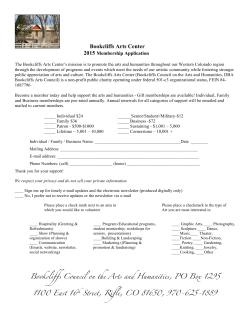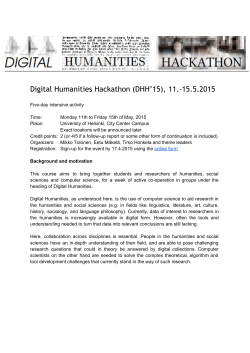
NEH Challenge Letter - Office of the Vice President for Research
To: Distribution List From: Monica Fishel, Faculty Research Support Officer Allison Hagerman, Faculty Research Support Officer Office of the Vice President for Research Subject: National Endowment for the Humanities Challenge Grants Date: March 17, 2015 NEH challenge grants are capacity-building grants, intended to support significant humanities activities of high intellectual quality and to help institutions secure long-term support for their humanities programs. Through these grants many organizations and institutions have been able to increase their humanities capacity and secure the permanent support of an endowment. Grants may be used to establish or enhance endowments or spenddown funds that generate expendable earnings to support and enhance ongoing program activities. Challenge grants may also provide capital directly supporting the procurement of long-lasting objects, such as acquisitions for archives and collections, the purchase of equipment, and the construction or renovation of facilities needed for humanities activities. Funds spent directly must be shown to bring long-term benefits to the institution and to the humanities more broadly. Grantee institutions may also expend up to 10 percent of total grant funds (federal funds plus matching funds) to defray costs of fundraising to meet the NEH challenge. Because of the matching requirement, these NEH grants also strengthen the humanities by encouraging nonfederal sources of support. NEH welcomes proposals related to its new initiative, The Common Good: The Humanities in the Public Square. This initiative seeks to connect the study of the humanities to the current conditions of national life. Many of today’s challenges require more than ever the forms of understanding and knowledge represented by the humanities. They require the broadest possible engagement of scholars and the public with the resources of the humanities, including but not limited to the study of language, literature, history, philosophy, comparative religion, and ethics. The study of the humanities can help illuminate the complexity of many contemporary challenges while enriching our understanding of the common good. NEH will give equal consideration to all applications in accordance with the program’s evaluation criteria, whether or not they respond to the Common Good initiative. NEH also welcomes plans to strengthen the technological infrastructure of humanities institutions, thereby enhancing the applicant institution’s ability to use new technologies in research, education, preservation, and public programming in the humanities. (Through income from a technology endowment an institution can enhance its technological capacity by supporting maintenance and upgrades of equipment, software, and data; licensing fees; salaries of technical staff; faculty and staff training in uses of digital technology; and other ongoing expenses associated with using digital technology in the humanities.) The grant period for all challenge grants begins five months before the application deadline, and the grant period for most challenge grants ends sixty-eight months later. Thus the grant period for applications submitted at the May 2015 deadline begins December 1, 2014, and ends July 31, 2020. The requested grant amount should be appropriate to the humanities needs and the fundraising capacity of the institution. The federal portions of NEH challenge grants have ranged in recent years from $75,000 to $500,000. Requests for more than $500,000 are unlikely to be funded at that level. Successful applicants will be offered a matching grant. Recipients must raise three times the amount of federal funds offered. Arrangements for meeting matching requirements must be made in advance of submission of the pre-proposal. Additionally, the level of matching/external/in-kind cost share contributions will be used as criteria for evaluation during review by the Limited Competitions Committee. To be eligible for matching, gifts may not derive from the grantee institution itself. It is inappropriate for an institution to shift internal budgets or reallocate internal funds for matching purposes. All matching pledges and gifts must be new—that is, given (and pledges fulfilled) during the challenge grant period. Challenge grants funds, federal or nonfederal, may not be used for recovery of indirect costs. The deadline for the full proposal is May 5, 2015. Please see the following link for more information: http://www.neh.gov/files/grants/challenge-grants-may-52015-edit.pdf This is a limited competition; each institution is limited to one proposal. Please submit your 3-page preproposal (plus budget, cost share arrangments, and CV; all documents in a SINGLE PDF file, 11 point font) by NOON on Friday, April 3, 2015 to limited@unm.edu with the subject line indicating NEH Challenge Grant - your name. No late submissions will be considered. The pre-proposal should address the major points that will be included in the proposal narrative (including: a description of the significance and intellectual quality of the humanities activities, programs, and holdings that the challenge grant would support; the institution’s long-range plans for advancing and/or disseminating humanistic knowledge, including how the institution, through its mission, personnel, governance, facilities, and resources, is capable of sustaining outstanding humanities activities; a description of how grant funds will strengthen and improve knowledge and understanding of the humanities; and the plans for raising funds to meet the NEH matching requirement. Offer evidence of long-term financial stability at the institution. The narrative should be accompanied by a draft budget overview and an abbreviated PI CV. The scoring will be weighted as follows: proposal narrative (60%), draft budget overview & cost sharing plan (25%), and abbreviated PI CV (15%). Should you have any questions please feel free to contact Allison Hagerman (alphao@unm.edu) or Monica Fishel (mlfishel@unm.edu). If you are affiliated with HSC, please contact Corey Ford at 272-6950 for more information.
© Copyright 2025









